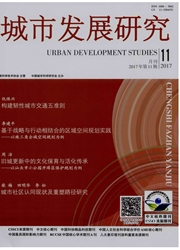

 中文摘要:
中文摘要:
发达国家城市正向功能专业化转型,企业组织形式变革直接导致了城市的功能转型。在功能专业化背景下,城市间将出现更多的信息联系、决策联系以及资本联系,更需要面对面的交流。一些城市专业化高端功能,成为区域的控制中心,另一些城市则承担价值链的低端功能。本文基于全球500强跨国公司在华投资数据,探讨中国城市功能专业化趋势。在1979-2008年间,跨国公司在地理和功能上都显著地进行了扩张。跨国公司相同功能和互补功能集聚在相同城市,跨国公司的渐进式多次投资导致了公司内不同功能在相同城市的地理集聚。本文结果表明,中国城市尤其是在城市体系高端的城市具有吸引价值链高端功能的竞争力,呈现一定功能专业化趋势。跨国公司在东道国内部的功能布局提供了考察城市经济转型的独特视角。
 英文摘要:
英文摘要:
There has been a transformation of urban structure from mainly sectoral to functional specialization in the developed countries. This transformation is inextricably interrelated with changes in firms' organization. Functional specialization will change the nature of economic linkages between cities and would trigger information and knowledge flows between cities, demanding more facetoface contacts. Some cities would host upstream functions of the value chain such as headquarters and research & development while others host downstream function such as processing, fabricating and integration. This paper examines the tendency of functional specialization of Chinese cities by exploring the functional locations of multinational corporations. Based on data froin Fortune Global 500 MNCs during 1979 ~ 2008, this study found that MNCs have gradually expanded in China functionally and geographically. Similar functions tend to agglomerate in certain cities while complementary functions coagglomerate in some cities. Sequential investments led to the spatial clustering of MNCs' functions. The empirical results found strong evidence of agglomeration effects of functional and cross-functional agglomeration of Fortune Global 500 MNCs and some evidence of functional specialization in Chinese cities, with upstream functions clustering in the top tier cities of the politically and economically urban hierarchy. The functional locations of multinational corporations provide a valuable angel to examine the urban transformation.
 同期刊论文项目
同期刊论文项目
 同项目期刊论文
同项目期刊论文
 Regional and Sectoral Differences in the Spatial Restructuring of Chinese Manufacturing Industries i
Regional and Sectoral Differences in the Spatial Restructuring of Chinese Manufacturing Industries i Spatial Organization of Fortune Global 500 Corporations in China: An Empirical Study of Multinationa
Spatial Organization of Fortune Global 500 Corporations in China: An Empirical Study of Multinationa Geographical Dynamics and Industrial Relocation: Spatial Strategies of Apparel Firms in Ningbo, Chin
Geographical Dynamics and Industrial Relocation: Spatial Strategies of Apparel Firms in Ningbo, Chin The Productivity Puzzle of Chinese Exporters: Perspectives of Local Protection and Spillover Effects
The Productivity Puzzle of Chinese Exporters: Perspectives of Local Protection and Spillover Effects 期刊信息
期刊信息
